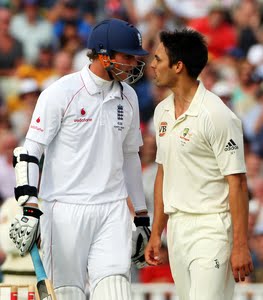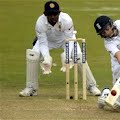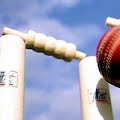By Garfield Robinson
Nobody thought Stuart Broad would have bothered to wait for umpire Aleem Dar to raise his finger. The edge, from a Ashton Agar delivery, was so thick and so apparent to everyone that the batsman was expected to turn and head for the pavilion. But he didn’t walk. The umpire didn’t give the signal. And Broad remained at the crease until stumps to grow his partnership with Ian Bell a further 33 runs and England’s lead to 261.Runs that could be very important to the outcome of the game.
 The Aussies, though understandably upset right afterwards, took it rather well and got on with the game. They really had no choice really, for they are renowned non-walkers themselves.
The Aussies, though understandably upset right afterwards, took it rather well and got on with the game. They really had no choice really, for they are renowned non-walkers themselves.
When Adam Gilchrist chose to walk during the 2003 World Cup semi-final against Sri Lanka though not given out by the umpire, and announced to the world that he would be joining the diminishing ranks of the walkers – those who stick bat under arm and remove themselves from the middle as soon as they know they are out without waiting on the umpire’s decision – his colleagues reacted with bewilderment. The idea of walking was as far removed from them as the earth is from the sun. The late Tony Grieg, in discussing the incident, made the joke that Gilchrist was the first Australian to walk since Doug Walters lost his car keys.
Michael Holding’s test career was just three game’s old in Sydney, 1975 when Ian Chappell clearly edged a delivery through to wicketkeeper Deryck Murray. The umpire, Reg Ledgwidge, was unmoved, while the batsman fidgeted with his gear, behaving as if nothing untoward had happened. The big pacer, who would go on to terrorize batsmen the world over, “slumped to his haunches and wept with anger,” according to captain Clive Lloyd. It was some time before he agreed to continue bowling.
Agar, though disappointed hardly missed a step. Playing in only his first test he would have been already steeped in the Australian way of waiting on the decision of the umpire, regardless of how clear-cut the dismissal. If you are willing to take advantage of umpiring errors yourself then you have to be prepared to accept it when the opposition does the same.
This business of walking is tricky. Batsmen who don’t subscribe to the practice often cite, in mitigation, the fact that they are sometimes given out erroneously, and that fielding teams often appeal when they know the batsman is not out. These are fair points. Bowlers and fielding teams will gladly accept a wicket even when they know the decision is erroneous. Is that a greater offence than a batsman standing his ground when he knows he should be given out?
And what of batsmen who are selective walkers. Those who will walk depending on their own circumstances and the circumstances of the game. They will walk if they are 150 and their team is way ahead of the opposition, but they will stand their ground if they haven’t yet scored and the opposition has them cornered. If we look askance at batsmen who refuse to walk then we should do the same to bowlers and fielders who appeal when they know the batsman should not be given out. Why should batsmen be held to a higher standard than bowlers and fielders? Why should more integrity be expected of them?
Since there will never come a time when every player plays with total honesty it is best to leave the decision to the umpire. This might seem extreme, but perhaps batsmen should not be allowed to walk and all decisions should be left up to the umpire, assisted by all the technology that is available. The Broad decision could have been avoided if the umpire had the option of using the available technology. Australia had exhausted their reviews but why should it left up to the players? Isn’t it in the interest of the game to get the correct decision every time?
Broad will begin the fourth day on 47. If England go on to win the game and Broad’s bonus runs turns out to be pivotal to the victory he should in no way be vilified because the umpire didn’t send him on his way when he should have. The Australians should understand because they know they would have done the same.














